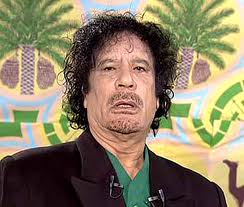Malik El-Bakouri, a 27 year old doctor from Tripoli, admitted that Colonel Muammar Qaddafi was not living like a rich man. But his sons, all the people in his tribe and all the families around him lived a good life for 40 years.
In consideration to Colonel Qaddafi’s noted extravagance, the residences of the House of Qaddafi were not quite as grand as people might have thought. They lacked the splendor of Saddam Hussein’s marbled palaces.
In one farm, horses wandered by marble statues of lions, tigers and bears, and on a sun baked day, reindeer grazed by the deck of an empty pool. At the home of one son, Saadi, there were signs of a life so ordinary in its seeming frustration.
A man who drifted through stints as an athlete, soldier and Hollywood producer, Saadi kept the English language self help book ‘Success Intelligence’ in his master bedroom.
For somebody who’s very rich he was very cheap, according to Fuad Gritli referring to Qaddafi, as he drove through a sprawling parcel near the airport known as the Farm where Colonel Qaddafi lived.
Inside the Farm, there are rolling, irrigated fields. Camels wandered unattended. Still standing was a tent where Colonel Qaddafi met foreign dignitaries, its canvas decorated with pictures of camels and palm trees.
National Atlantic Treaty Organization (NATO) bombers destroyed an unfinished Moroccan style house, other tents built with more expensive canvas and bunker style concrete buildings for official use.
The villas of Colonel Qaddafi’s sons on a sand dune overlooking the Mediterranean were not lavish, the brown paint on the patio decks was peeling, and they had a distinctly 1970s feel. But to the young Libyan fighters roaming through the quarters of one son, Hannibal, there was just enough luxury to inspire envy in a country whose wealth is squandered.
Muatassim, another of Colonel Qaddafi’s sons and the country’s national security adviser, surrounded himself with more luxury. A driveway with a fountain featuring four horse drawn carriages led to a pool bungalow, with Roman columns at the entrance and topped by gold domes.
Now, as the former subjects of Colonel Qaddafi comb through his family’s estates, farms and seaside villas, the properties are revealing the details of lives lived far removed from the people, and ones filled with the signs of their slight offenses and competition.
In Tripoli, the physical remains of the leader’s rule still projected the distance between power and powerlessness. As Libyan rebels and residents picked through the loose fragments of the Qaddafi’s lives, there was a sense of laying claim to a country commandeered by the Arab world’s longest ruling leader and speaking their minds without fear about the country they have inherited, and the leader they hope and they have left behind.
Qaddafi chose to name himself as their ‘Brother Leader’, though his nearly 42 years of rule were rarely brotherly, and his leadership left a country where the majority of his people still remain poor.
